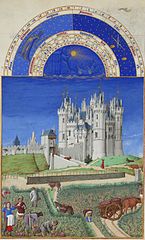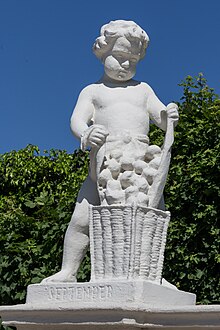September
In the Gregorian calendar, September or September is the ninth month of the year and has 30 days. Its name derives from having been the seventh month of the Roman calendar. September is a word from the Latin meaning "seven months". Despite being the ninth month today thanks to the contribution of the Julian calendar, it is the seventh month in the Roman calendar, since March was considered to be the first month of the year, and December the last.
Both spellings, "setiembre" and "septembre", are correct, although there is a preference for the latter, especially in cult or academic use. In at least Argentina, Costa Rica, Peru, and Uruguay there is use, even in educated and academic environments, of the option without p.
Events in September
- On September 1, 1939, German troops invaded Poland, triggering World War II.
- On September 2, 1945, Japan signed its surrender to the Allies, definitively ending the Second World War.
- On 8 September 2022, Queen Elizabeth II of the United Kingdom died at age 96, after 70 years of reign, the second longest reign.
- On September 11, 1714, Barcelona falls before the Bourbon troops, after 14 months of siege during the Spanish War of Succession. This resistance is commemorated on the Day of Catalonia.
- On September 11, 1973 in Chile a coup d'etat occurred and the military dictatorship began, which would last until 1990.
- On September 11, 2001, the attack on the Twin Towers was perpetrated in the United States.
- On September 15, the anniversary of the signing of the Act of Independence of the United Provinces of Central America is celebrated in Guatemala, where the current Republics of Guatemala, El Salvador, Honduras, Nicaragua and Costa Rica are independent of Spain.
- On September 16, the anniversary of the beginning of the Mexican Independence War is celebrated.
- On September 18th and September 19th, the anniversary of the First National Board of Government of Chile known as Patrias Festivals is celebrated.
- Depending on the year, between 21 and 23 September, the Western Hemisphere and the Ocean Hemisphere began in the southern hemisphere in the spring and, in the northern hemisphere, the Eastern Hemisphere and the Continental Hemisphere in the fall.
- On 21 September, the International Day of Peace is celebrated worldwide. This is held every year since 2002. In 1981, the General Assembly of the United Nations (UN) decided that, every year, the opening day of its regular session would be officially proclaimed as the International Day of Peace, and would be dedicated to "conmemorating and strengthening the ideals of peace in each nation, in each people and among them," as resolution 36/67 stated. But since 28 September 2001, following the new resolution 55/282, it was proclaimed as a fixed date for the International Day of Peace on 21 September.
- On September 19, 2021 there is a volcanic eruption on the island of La Palma (Islas Canarias, Spain).
- On September 21, the Youth Day is celebrated in Paraguay and Argentina for the beginning of spring.
- The International Day of Bisexuality is celebrated on 23 September.
- On September 26 the Flag of Ecuador is celebrated and the film Ema film by Pablo larrain in Chile is premiered.
- On September 27, the anniversary of the consummation of the Independence of Mexico is celebrated.
Variable date
- The German Oktoberfest and the August Moon Festival are celebrated (more correctly called Festival de Mitad de Otoño).
- In Colombia, the third Saturday of September is celebrated on the Day of Love and Friendship.
- In Japan, the third Monday of September is celebrated the Day of Respect for the Elders.
- In many countries of the northern hemisphere in September the school year begins.
- In Canada and the United States, the first Monday of September is the Labor Day.
- In Canada and the United States, the first Sunday after Labor Day is celebrated on Grandpa's Day.
- The Hispanic Heritage Month is held in the United States from 15 September to 15 October. On 18 September, the establishment of the first National Board of Government is commemorated.
Three places disputed being the milestone of national celebration, although the truth is that only two of them ever managed to be considered as dates at the height of September 18.
- The Chilean Independence Act was dated in Concepción on January 1, 1818. This has been endorsed by different historians and by the Penquista city itself, which in recent years has promoted its character as the City of Independence to commemorate this milestone.
September in Astronomy and Astrology
The September equinox occurs in this month, and certain celebrations are organized around it. It is the autumnal equinox in the northern hemisphere, and the spring equinox in the southern hemisphere. Dates may vary from September 21 to September 24 (in UTC).
September is mostly in the sixth month of the astrological calendar (and the first part of the seventh month), which begins at the end of March / Mars / Aries.
Symbols of September
- The signs of the zodiac for the month of September are Virgo (until 22 September) and Libra (from 23 September onwards).
September flowers are forget-me-nots, morning glory, and asters.
- In some countries it is often considered that the precious stone of September is the sapphire.
Other names
- In Croatian, September is called rujan (‘[mes] red’) because the leaves become red before fall.
- In Czech, September is called září ('brillo').
- In Finnish, September is called syyyskuu (' autumn months').
- In Polish, September is called wrzesień ('the month the silent flowers bloom').
- In Turkish, September is called eylül (in Arabic) eylûl), in Syrian aylûl means ‘uva’; in this way it would mean month of grapes. Another most likely etymology makes it come from the Hebrew month Elul.
- In Amharic and Tigria, September is called meskerem, because it is the month when the meskerem yellow flowers bloom, which marks the beginning of the new year according to the ancient orthodox Christian calendars of Eritrea and Ethiopia, and also the beginning of the great season of harvests in both countries.
- In Chinese, September is called (ji wave yuè), which means ‘month nine’.
- In Paraguay in the Guaraní language September is Jasyporundy. "Jasy" means moon and "porundy" is number nine. It refers to the ninth moon cycle in a year.
Iconology
September, September, is under the protection of Vulcan, and is usually represented as a man who only wears a kind of cloak on his back. Ausonio makes him have a lizard and also next to him the vats and other glasses prepared to receive the vintage wines.
September received different names in Ancient Rome:
- It was called Tiberius by agreement of the Senate in honor of Emperor Tiberius who according to Suetonius did not want to accept this distinction
- it was called Germanicus according to Domiciano's command for the victories it reached over the Germans
- adopted the name of Antoninus by Senate agreement in honor of Antonino Pio
- Herculeus He called it Commodo in honor of Hercules
- Tacitus named him the Emperor Tacitus because he was born this same month.
Miscellaneous
- This month the school year begins in the countries of the northern hemisphere.
- Every year, September begins the same day of the week as December.
- In 1752, the British Empire adopted the Gregorian calendar. That year, September 2 was followed by September 14.
- In Usenet it is said that the month of September 1993 (Eternal September) never ended.
- In the southern hemisphere, from the point of view of the stations, September is equivalent to March in the northern hemisphere and vice versa.
- The Second World War began and ended in September, almost on the same day (1939-1945).
Other data
- For the Catholic Church, this month is dedicated to angels.
Contenido relacionado
139 BC c.
April 3
May 16






